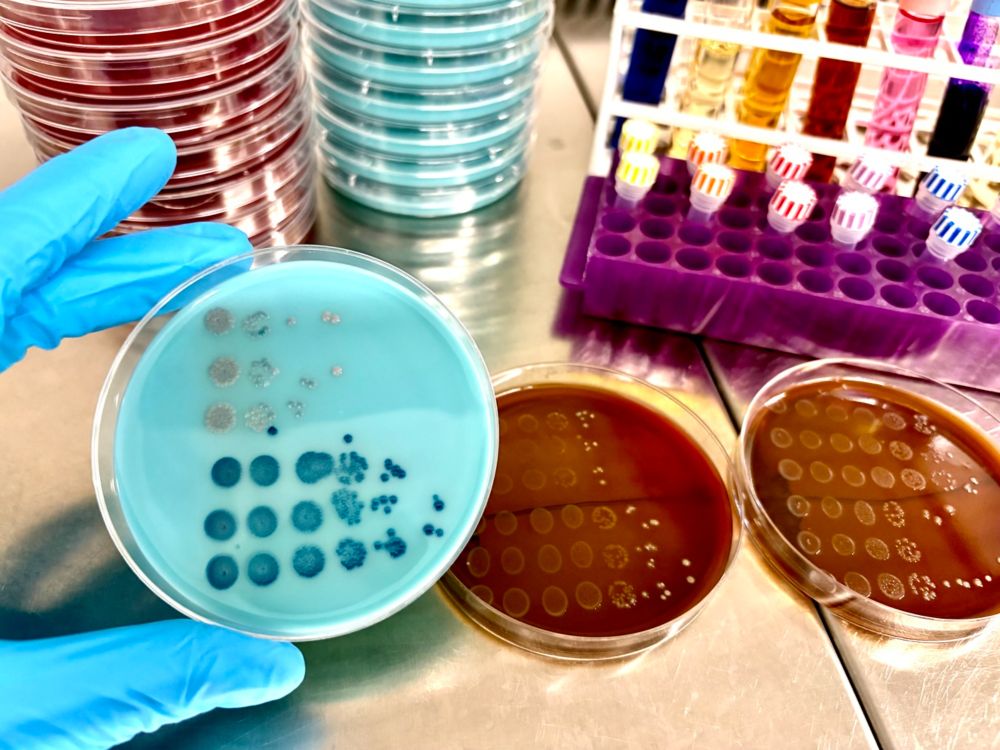Julie A. K. McDonald
@julieakmcdonald.bsky.social
Associate Professor at the CBRB at Imperial College London. Studying how gut microbiota-mediated colonisation resistance protects the host against infections. https://www.imperial.ac.uk/people/julie.mcdonald
Congrats! That's such great news! 😊
July 29, 2025 at 3:31 PM
Congrats! That's such great news! 😊
Yes, that's a good question! The elderly are potentially exposed to more antibiotics and could also have differences in their diet compared to younger adults, which could impact the availability of nutrients VRE are exposed to in the gut.
July 25, 2025 at 9:18 AM
Yes, that's a good question! The elderly are potentially exposed to more antibiotics and could also have differences in their diet compared to younger adults, which could impact the availability of nutrients VRE are exposed to in the gut.
We’ve also written a Behind the Paper blog post to accompany our article, which you can find here: go.nature.com/401ctsa

Antibiotics fuel the rise of vancomycin-resistant enterococci intestinal colonisation by remodelling the metabolic landscape of the gut microbiome
Antibiotics save lives- but also reshape the gut microbiome, unintentionally promoting VRE colonisation. This study reveals how antibiotic-driven metabolic shifts promote VRE expansion and highlights ...
go.nature.com
July 22, 2025 at 9:12 AM
We’ve also written a Behind the Paper blog post to accompany our article, which you can find here: go.nature.com/401ctsa
This microbiome therapeutic could be composed of a mixture of gut commensals that can deplete nutrients (that were enriched with antibiotic treatment) and restore the production of inhibitory microbial metabolites (that were depleted with antibiotic treatment).
July 14, 2025 at 9:11 AM
This microbiome therapeutic could be composed of a mixture of gut commensals that can deplete nutrients (that were enriched with antibiotic treatment) and restore the production of inhibitory microbial metabolites (that were depleted with antibiotic treatment).
This study will help guide the rational design of new microbiome therapeutics that could be used to restrict VRE intestinal growth, and subsequently reduce the development of invasive VRE infections.
July 14, 2025 at 9:11 AM
This study will help guide the rational design of new microbiome therapeutics that could be used to restrict VRE intestinal growth, and subsequently reduce the development of invasive VRE infections.
Finally, we showed that VRE occupied overlapping but distinct nutrient-defined intestinal niches, where VRE had high growth when cultured with other VRE species and when cultured with other multidrug-resistant pathogens (carbapenem-resistant Enterobacteriaceae).
July 14, 2025 at 9:11 AM
Finally, we showed that VRE occupied overlapping but distinct nutrient-defined intestinal niches, where VRE had high growth when cultured with other VRE species and when cultured with other multidrug-resistant pathogens (carbapenem-resistant Enterobacteriaceae).
Killing of gut commensals with antibiotics also resulted in reduced nutrient competition, which led to an increase in the concentration of a wide range of nutrients. We showed that VRE used most of these nutrients as carbon or nitrogen sources to support their growth.
July 14, 2025 at 9:11 AM
Killing of gut commensals with antibiotics also resulted in reduced nutrient competition, which led to an increase in the concentration of a wide range of nutrients. We showed that VRE used most of these nutrients as carbon or nitrogen sources to support their growth.
We showed significant but incomplete suppression of VRE growth by individual metabolites that were decreased with antibiotic treatment. However, mixtures of metabolites provided complete or near complete suppression of VRE growth.
July 14, 2025 at 9:11 AM
We showed significant but incomplete suppression of VRE growth by individual metabolites that were decreased with antibiotic treatment. However, mixtures of metabolites provided complete or near complete suppression of VRE growth.
Killing of gut commensals with antibiotics resulted in reduced production of many microbial metabolites normally produced by gut commensals.
July 14, 2025 at 9:11 AM
Killing of gut commensals with antibiotics resulted in reduced production of many microbial metabolites normally produced by gut commensals.
We showed that VRE colonise the antibiotic-treated intestine due to killing of gut commensals (members of the gut microbiome).
July 14, 2025 at 9:11 AM
We showed that VRE colonise the antibiotic-treated intestine due to killing of gut commensals (members of the gut microbiome).
Broad-spectrum antibiotics significantly promote VRE intestinal colonisation, causing the intestine to act as a reservoir for VRE that seed difficult-to-treat infections, such as bloodstream infections.
July 14, 2025 at 9:11 AM
Broad-spectrum antibiotics significantly promote VRE intestinal colonisation, causing the intestine to act as a reservoir for VRE that seed difficult-to-treat infections, such as bloodstream infections.
We showed that intestinal niches occupied by VRE were defined by the abilities of VRE to use specific nutrients that were enriched with antibiotic treatment and their abilities to grow with reduced concentrations of inhibitory microbial metabolites.
July 14, 2025 at 9:11 AM
We showed that intestinal niches occupied by VRE were defined by the abilities of VRE to use specific nutrients that were enriched with antibiotic treatment and their abilities to grow with reduced concentrations of inhibitory microbial metabolites.

